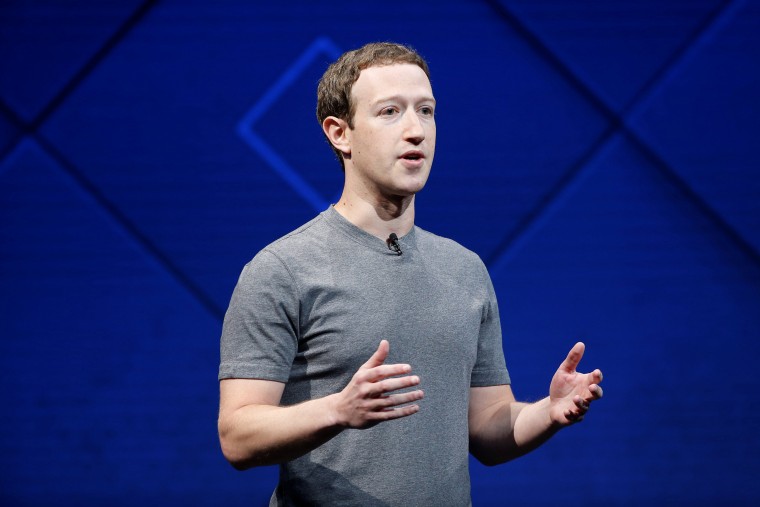Social media may be past its peak, and the latest person to call it is Facebook CEO Mark Zuckerberg.
Zuckerberg, who built the world’s largest social network in part by persuading billions of people to share details of their lives online and then showing them ads based on their activity, said he was shaking up the company to focus less on sharing and more on creating private experiences.
Increasingly, people "want to connect privately in the digital equivalent of the living room," and less in an online "town square," and that will affect the future of the company, Zuckerberg said in a new post on Facebook.
The announcement reflects the shifting behavior of people online, which for years has pointed toward slowing growth in social media.
While Zuckerberg years ago spoke eagerly about the possibility of exponential growth in public sharing, the sharing of personal updates on Facebook has waned, and no significant new social networks have launched to rival Facebook's dominance as the No. 1 network. Outside the United States, services such as WeChat and the Facebook-owned WhatsApp have seen explosive growth by focusing on messaging.
Google is in the process of taking its social network, Google+, offline, and Twitter is considering an array of changes to make conversation on its social network healthier.
Publicly shared posts have at the same time presented major challenges for Facebook as conspiracy theories go viral and the company struggles to enforce its rules prohibiting hate speech and harassment.
If the changes begin to emphasize private conversations, Facebook will have less work to do enforcing speech rules, said Antonio Garcia Martinez, a former Facebook manager. "That's on ya'll now," he said in a marked-up commentary of Zuckerberg's post.
Martinez also criticized social media as increasingly fake: "Nobody says anything non-performative publicly anymore."
Facebook's shift in corporate focus, which Zuckerberg said would happen over a few years, would mean less sharing on services such as Facebook and Instagram and more private messages that cannot be seen by anyone else, including by people at the company, because they’d be encrypted.
“In a few years, I expect future versions of Messenger and WhatsApp to become the main ways people communicate on the Facebook network,” Zuckerberg said.
In recent years, Facebook has posted more job listings that reference "privacy," according to data from Thinknum, a company that collects data on the internet.
“We're focused on making both of these apps faster, simpler, more private and more secure, including with end-to-end encryption,” he added. “We then plan to add more ways to interact privately with your friends, groups and businesses.”
Compared with public social networks, he said, “messaging services evolve gracefully and remain intimate,” even when people add friends over time.
Zuckerberg did not say how personalized advertising might change as a result of the shake-up.
WhatsApp messages are already encrypted end-to-end, which means the messages are not stored on WhatsApp's servers and the company can't read them or hand them over to authorities. Facebook's Messenger has a similar feature that users can opt into, and Zuckerberg said the company would work toward implementing the same encryption for all private communications.
Facebook's services should also be "interoperable," he said, so that people could use their Instagram account to message someone on WhatsApp. That kind of data-sharing has raised concerns among some regulators, including Facebook's European regulator, because of user privacy or the lack of competition.
Ashkan Soltani, a former chief technologist of the Federal Trade Commission, said the timing of the announcement could be a way to get ahead of any antitrust objections.
"Zuckerberg is a master of leveraging #privacy for anti-competitive advantage," Soltani said on Twitter.
Other changes would address what Zuckerberg called the "permanence problem." Facebook and Instagram already offer the ability to post images and video that disappear after 24 hours, an idea made popular by Snapchat, and Zuckerberg said he's interested in extending the concept.
"People want to know that what they share won't come back to hurt them later, and reducing the length of time their information is stored and accessible will help," he said.
Zuckerberg said he was describing the changes well ahead of time because they would mean “taking positions on important issues concerning the future of the internet” and the company would consult with outside experts and others.
Alex Stamos, the former chief security officer of Facebook, said on Twitter that he was surprised by the post and noted that the changes would take time to implement.
"This isn't a post I expected to read, and I wish he wrote it two years ago," tweeted Stamos, who is also an NBC News contributor. "Hopefully the external vision is reflected in internal moves to change product culture that informs thousands of product and engineering decisions per year. Turning a ship that large is difficult."
